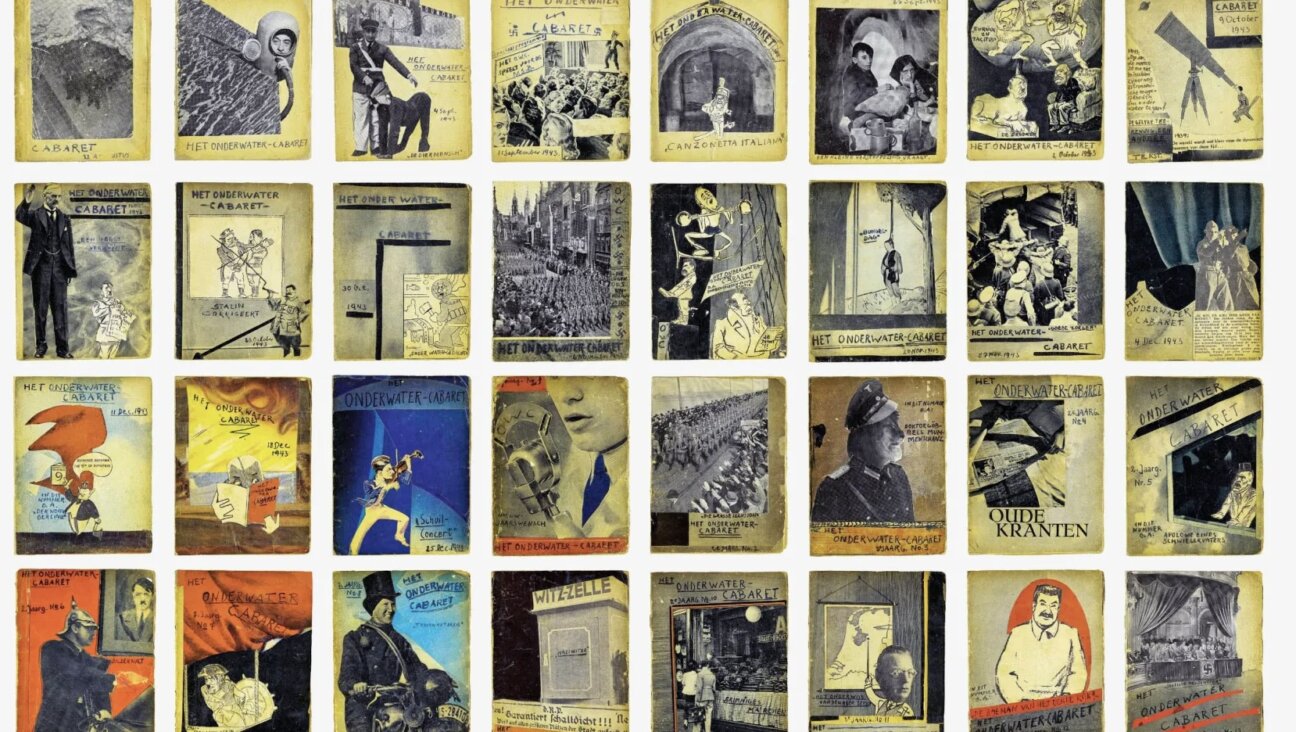Interview With ‘Fiddler on the Roof’s’ Motel the Tailor Reveals a Gutsy Entrepreneur Role Model

Graphic by Angelie Zaslavsky
Relishing the newest production of “Fiddler on the Roof” by Joseph Stein (book) Jerry Bock (music) and lyricist Sheldon Harnick I experienced an Aha! moment that altered my perception of the character “Motel the tailor” as portrayed by Adam Kantor. Watching Kantor’s interpretation in what was my seventh “Fiddler,” it occurred to me that it was not the going-to-change-the-world Siberia-bound character Perchik who was the revolutionary, but the wimpy Motel with his sewing machine and entrepreneurial spirit brought “modernity” into the shtetl culture making him the “poster boy” of the thousands of Pogrom-fleeing needle trade workers who later filled the ranks of the Jewish garment workers labor movement in America.
Sholem Aleichem had been part of my Yiddish literary landscape in pre-war Warsaw where as a child I first read “Tevye der Milkhiger” (Tevye the Milkman). I still remember the astonishing 1938/39 exhibition of Tevye’s shtetl Kasrilevke at Warsaw’s Morgenstern Sports Center (where I took gymnastics classes) with all the houses, marketplace, props and landscape constructed entirely of matchboxes! Decades later at Queens College, under the linguistic baton of Prof. Itche Goldberg, a dissertation on Sholem Aleichem’s “Eizenbahn Geschichtes” (Train Stories) and an in-depth analysis of the Tevye character Motel — who was not given his due.
When I caught up with Kantor to discuss his interpretation of the Motel persona, he offered an in-depth overview of his own family’s roots — Kovno, Vilna, Minsk, Riga and Belarus.
Masha Leon: Did you audition just for Motel the tailor or for other roles as well?
Adam Kantor: I auditioned for Motel…had one callback and got it.
ML: Why Motel?
AK: Why not? It’s one of the best characters ever written, a beautiful arc — you see the boy become a man and through him the audiences on Broadway see the tenacity of the American dream…. This poor guy who dreams big and goes after something crazy and gets all he dreams of — a hat, the girl, the machine…a beacon of light.
ML: Were you influenced by prior Motels?
AK: My vision of Motel is one of rebelling, revolution in its own, more pragmatic than Perchik — the idealistic revolutionary — who ends up in Siberia in prison.”
ML: In other words his revolt is a transformational here and now act.
AK: I was inspired by previous Motels and I think that this interpretation is very much my own. Austin Pendleton — the first Motel — inspired me and gave me some great stories about creating the role of Motel…it’s a sort of having his blessing and being a guardian angel during this process.
ML: Did you use any of your predecessor’s “schtick” or mannerisms or were you at the mercy of the director and his vision of this role?”
AK: It was a very happy collaboration. I would come in with ideas and Bart (director Bartlett Sher) would throw in an idea…I would run with it…We are packing to leave Anatevka…I have to get this table offstage…. I lift this enormous table on which there were items I was placing on my cart…I was looking to impress Tevye…my journey into manhood—not in the script….
ML: Do you change your interpretation from time to time or is it choreographed to within an inch of Jerome Robbins’ vision because — in your own way — you are “dancing” your own role?
AK:: Bart used the term “let it deepen, not widen…find new layers…” I am still finding things.
ML: Is the sewing machine a replica or an actual “antique” version?
AK: I think it’s an original.
ML: Several of my aunts, uncles[who perished in the Holocaust] were all sewing machine artists — tailors,dressmakers.. My early memories are interwoven with the “whirr” of a hand-operated sewing machine. During the war — when we escaped Warsaw and landed in Vilno, my mother managed to find a hand-operated Singer machine thanks to which she earned money to keep us in food.”
















